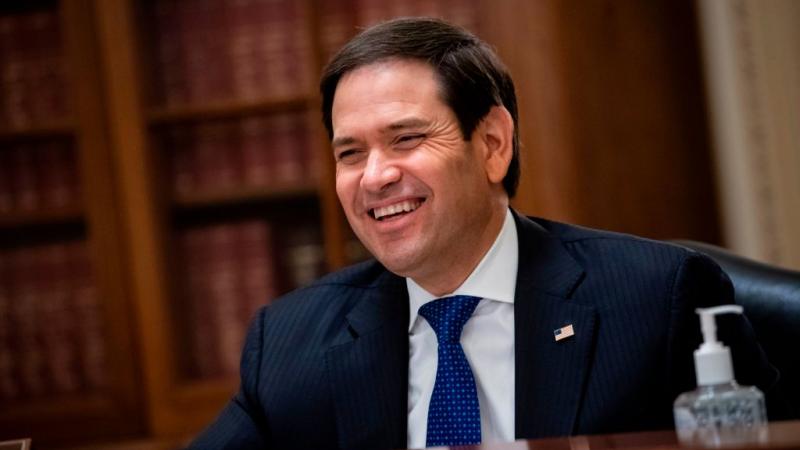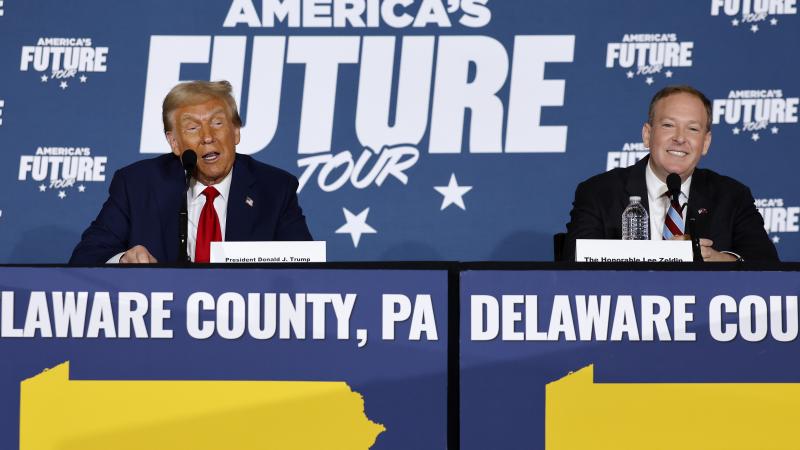House Judiciary Republicans take aim at ‘climate cartel’ on accusations of antitrust activities
"You are evil, and what you are attempting to do and the violations of law that you are engaged in is absolutely stunning,” Rep. Harriet Hageman, R-Wyo., told the panel of witnesses at the hearing.
A new front in the war against environment, social and governance (ESG) was opened this month as House Judiciary Committee Republicans released a report accusing left-wing environmental activists and major financial institutions of colluding to force American companies to adopt anti-fossil fuel policies.
The GOP committee members followed up the report with a subcommittee hearing last Wednesday in which they grilled representatives from some of those institutions they accuse of being part of a “climate cartel” violating antitrust laws, a charge the witnesses denied.
Rep. Thomas Massie, R-Ky., chair of the Antitrust, Commercial, and Administrative Law subcommittee, said that this “climate cartel” expressly requires investors who join them to pressure the companies they invest in to reach net zero emissions and adopt their desired left-wing policies.
Asset owners and managers, Massie said, then use the investments they control to force companies to disclose carbon emissions and adopt governance mechanisms that enforce climate commitments, even though these are bad for investors and consumers.
“The climate cartel engages in a series of escalating pressure tactics to force American companies to act against their own self interest and adopt its desired left wing policies,” Massie said.
Companies that go against this pressure, Massie continued, are targeted with shareholder resolutions demanding that the companies take the actions that the “climate cartel” wants them to take.
As an example, he pointed to the successful effort in 2021 by the activist investor group Engine No. 1 to replace three board members at ExxonMobil.
This amounts to, Massie said, anti-competitive collusion that aims to reduce the number of flights Americans take, get Americans to cut their beef consumption, and to keep fossil fuels in the ground.
Rep, J. Luis Correa, D-Calif., ranking member of the subcommittee, called the accusations an “attack on shareholders.” He argued that shareholders are owners in a company and have legal rights to hold corporations they invest in accountable.
“This is called free enterprise. And we should encourage it is pro-competitive, pro-democratic and pro-free market,” Correa said.
The witnesses, which included a representative from California Public Employees Retirement System (CalPERS), (CalPERS), which oversees $485.8 billion in investments, and Arjuna Capital, which Managing Partner Natasha Lamb said had $500 million in assets under management.
The witnesses argued that what is being described as collusion is just groups of investors and managers sharing information and collaborating.
Mindy Lubber, CEO of Ceres, described the work of the nonprofit she heads as working “with investors and companies to make the business case for action as they address some of the greatest global financial challenges facing our world today, challenges like climate change, water scarcity and pollution.”
Therefore, she argued, it’s part of their fiduciary duty to manage these risks.
Cajole and coordinate
Ceres, which has over 200 member investors with $44 trillion in assets under management, was the focus of a 2023 report by Consumers’ Research, a consumer advocacy nonprofit. The report accused Ceres of being a “globe-spanning pressure group” that works to “cajole and coordinate members of the finance industry into pushing harmful, anti-consumer ‘net zero’ targets at every major public company in the country.”
The group has been urging the Judiciary Committee to investigate Ceres for collusion. Will Hild, executive director of Consumers’ Research, told Just the News the hearing was encouraging.
“We're exceedingly pleased to see the House Committee taking this on. We think it's an incredibly important area to be investigated,” Hild said.
Hild also disputed the witnesses’ characterization of their activities as being just a matter of collaboration between colleagues. He said that they’re getting together to reward and punish companies according to how much they go along with their agenda.
“When you're talking about financial services companies, who make up large portions of the market share, colluding in the market to use their market share to do that, that's called an antitrust conspiracy,” Hild said.
Focus companies
With regard to the impacts to consumers, the Republicans on the subcommittee grilled the witnesses on whether or not their goal is to get oil companies to reduce the amount of oil and gas they produce.
Rep. Harriet Hageman, R-Wyo., said that what the witnesses described as “engagement” is “designed to fundamentally change business and industries to the detriment of consumers.” This makes the activities, she said, not collaboration, but collusion.
Hageman said that the modern world has seen in the last 100 years “mind-blowing” technological advances resulting in increased life expectancy and low infant mortality rates.
“There's one reason why we have seen the prosperity in the last 100 years that’s brought this. It’s never been rivaled in world history. And that's because of the commercial production of affordable energy. Every single one of you and your organizations want to destroy that. You are evil, and what you are attempting to do and the violations of law that you are engaged in is absolutely stunning,” Hageman said.
Hageman asked Dan Bienvenue, interim chief investment officer of CalPERS, about the goals of Climate Action 100+, an investor group of more than 700 investors and 170 companies, which CalPERS helped found.
Climate Action 100+, as it explains on its website, has 170 companies that it considers “key to driving the global net zero emissions transition. It focuses on these companies for “engagement,” and 42 of those companies are oil and gas producers.
Hageman recounted statements made in congressional testimony and depositions by leaders of the various groups the committee report calls the “climate cartel.” These statements explained that the goals of net zero emissions require fossil fuel companies to reduce or eliminate their production.
“One of the objectives of the Climate Action 100 is for these focus companies to reduce their emissions. Is that correct?” Hageman asked.
“Climate change is something that is happening,” Bienvenue answered, and Hageman restated the question. Bienvenue said that the goal of Climate Action 100 is to get companies to reduce their emissions.
Hageman asked Lubber if Ceres and Climate Action have targeted the livestock industry as an industry that must reduce its emissions, which she said would require them to reduce beef production.
“There are ways to do farming, and there are ways to create energy that are less greenhouse gas emitting. And many of the oil and gas companies that you were talking about, it's not about not producing. It's about creating options and transforming their technologies,” Lubber replied.
Seismic shift
Hild said that the witnesses’ claims that climate change is a risk and that addressing that risk is part of their fiduciary responsibility ignores many other risks that come with reducing emissions.
“They seem to think that's the only risk in the world. I don't hear them crowing about supply-chain risk with China. If we were ever again to a hot or lukewarm conflict, or even or even a cold economic conflict with them, it's going to pose risks,” Hild said, adding that these pressure groups exist only to push for a far-left progressive agenda.
Hild said the pushback against ESG efforts are having an impact, but he said it needs to be measured with balance. Consumers contacting their elected officials is having a “seismic shift,” he said, and they shouldn’t feel that they can’t go up against these big Wall Street firms.
However, Hild said that proponents of ESG are maneuvering to advance their agenda in a “much quieter conspiracy.” A lot of effort has been made on the state level, where legislatures have passed anti-ESG measures. Hild said, however, ESG firms are now promising to bring more investment capital to those states if they just drop their anti-ESG efforts.
“We can't take our foot off the gas and assume that we've won the ultimate victory,” Hild said. “We should absolutely be encouraged by the fact that the momentum has shifted in our direction. We just need to finish this fight so that our markets remain adulterated with this kind of obnoxious, collusive behavior that's anti-consumer and contributes to inflation.”
















